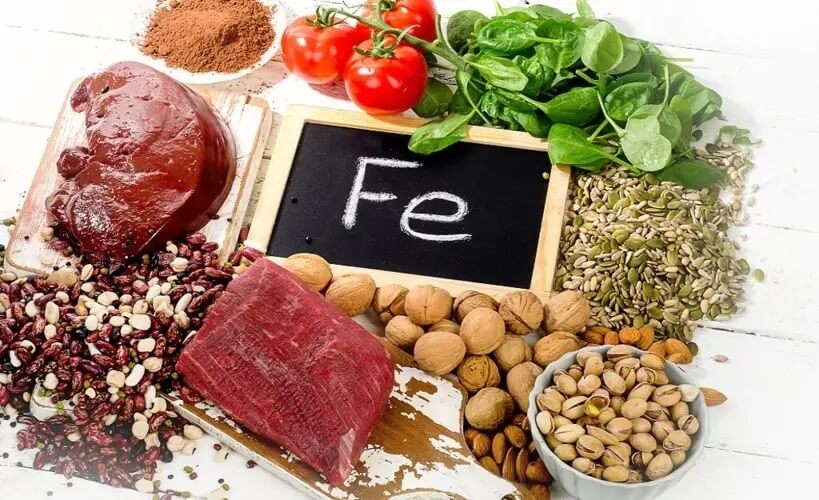If you’re not iron deficient, you’ll know someone who is! Iron deficiency is growing at a rapid rate. You can become iron deficient from heavy periods, IBS, coeliac disease, antacid use, gut absorption issues, stress… oh so many reasons! If your iron levels are low, it’s essential to understand why they are low. It’s only until you determine the root cause that the healing truly begins.
The low down on iron
Iron is an essential nutrient required for the production of haemoglobin – a necessity if you want to live and oxygenate your cells for energy. Red blood cells need haemoglobin and iron (along with folate, B12, B6 & protein) to efficiently send oxygen throughout the body. Your body requires oxygen for energy, which is why you can feel so debilitated when you’re iron-deficient.
How many iron deficiency signs & symptoms can you tick off?
- Unnecessary chronic fatigue
- Muscle weakness
- Brain fog/cognitive decline
- Shortness of breath
- Feeling faint or dizzy
- Pale skin
- Cold hands & feet
- Difficulty concentrating
- Craving ice cubes or high sugar/carbohydrate foods
- Sleeping for prolonged periods of time
- Hair loss
- Weak or brittle nails
- Irritability or anxiety
- Fast or irregular heartbeats
- Exercise intolerance (especially HIIT or cardio)
- Burning or pale tongue
- Low libido
- Low immunity/constantly getting sick
- Heavy or absent periods

Did you know...?
The optimal iron ranges are very different from the ranges you see on your blood test reports. Generally, healthy iron stores (ferritin) can be ranged between 15 - 200 but research confirms that anything under 30 is iron deficiency. Your iron levels should be well and truly above 30. Ideally, your ferritin should be above 60.
What’s your iron ferritin levels? Quick… go check your last pathology!
This is the same for your red blood cell investigations, e.g. total iron, total iron binding capacity, saturation and B12. The ranges are just too broad to identify if you’re within the optimal ranges. If you’ve been dealing with chronic fatigue or health issues for prolonged periods of time, you should see one of our health practitioners for a comprehensive health analysis.
What causes iron deficiency?
- Digestive problems/conditions: IBS, coeliac disease, ulcerative colitis, Crohn's disease
- Heavy periods/oestrogen dominance (often associated with endometriosis and uterine fibroids)
- Vegan or vegetarian diets
- Insufficient stomach acidity (think hiccups, acid reflux, GERD)
- Medication use
- Pregnancy and breastfeeding
- Underlying pathogens/infections
- Gastritis
- Increased inflammation
- Nutrient deficiencies: copper, zinc, B12, B6, protein
Your iron levels should be well and truly above 30. Ideally, your ferritin should be above 60.

The following foods/drinks inhibit iron absorption:
- Black/green tea
- Chocolate
- Berries
- Chard
- Calcium rich foods e.g. dairy, milk
- Wheat germ
- Nuts
- Oats
- Beans
- Eggs
- Soy
- Wine
- Coffee
- Foods high in ANTI-NUTRIENTS* (phytates, oxalates, tannins) that haven’t been prepared properly (beans, legumes, nuts, seeds)
*You must ensure that you’re soaking, sprouting, and properly preparing these anti-nutrient foods especially if you are a vegan/vegetarian so you can absorb iron and NOT hinder it.
Supplements & medications that inhibit iron absorption
- Zinc and calcium supplements
- Antacids
- Tetracyclines
- Ace inhibitors
- Fluoroquinolones
- Etidronate
What are the best forms of iron to look out for?
Iron bisglycinate is a form that has demonstrated superior bioavailability compared to other forms of iron in various studies across various population groups.
It’s also shown absorption in the presence of dietary phytates and polyphenols! This high solubility and absorption improves tolerability and minimises gastrointestinal upset that is commonly experienced in people who use poor quality forms of iron like ferrous fumarate and ferrous sulfates.
Try to avoid over the counter iron supplements that contain sulphates, these are usually cheap and commonly cause gastrointestinal upset. Your iron supplement should always have vitamin C as a co-factor to enhance absorption.
Our bodies can also only absorb approximately 24mg of iron each day. Try to avoid supplements with much more than this amount in each tablet as they can also cause gut issues and inflammation.
How to take your iron supplements
It is also important to consider iron absorption blockers like oxalates and tannins that are found in teas and coffee. Make sure you are drinking your tea and coffee two hours away from taking iron supplements or eating iron-rich foods to optimise iron absorption. On an empty stomach is best if well tolerated.

Dietary sources of iron
There are two forms of iron: heme iron and non-heme iron. You can get heme iron from animal sources and non-heme from plant-based sources but this needs vitamin C for absorption. Heme iron is significantly more absorbable than non-heme iron.
Some food sources of iron include:
- Oysters
- Turkey
- Almonds
- Liver
- Clams
- Beef steak, lean, cooked
- Kangaroo
- Sardines
- Quinoa
- Tempeh
- Parsley
- Apricots
- Chicken
- Pumpkin seeds
- Soy beans
- Molasses
- Pine nuts
- Bone broths
- White beans
- Cooked spinach
- Kidney beans
If you have digestive problems, slow-cooked meals, soups, broths and stews are great for nourishing your gut. We suggest you check out our newest book, the HAPPY HEALTHY YOU guide which features a curated collection of digestion-friendly recipes crafted from all-natural ingredients.
Testing your Iron
Ask your doctor to test for iron studies and co-factors which includes: B12, full CBC, serum iron, transferrin, transferrin saturation, and ferritin to examine and determine the status of your iron levels.
Your red blood cells have a 90-day turnaround time, so you’ll generally find your energy will peak after three months of focused treatment.
If you are struggling with chronic fatigue, you should always investigate this further. Do not give up without an answer as to WHY you are chronically fatigued. Imagine… feeling ENERGISED again!? It’s totally worth it.
Reach out to one of our qualified health practitioners in our Online Clinic for more personalised treatment options to increase your iron.










Leave a comment
This site is protected by hCaptcha and the hCaptcha Privacy Policy and Terms of Service apply.